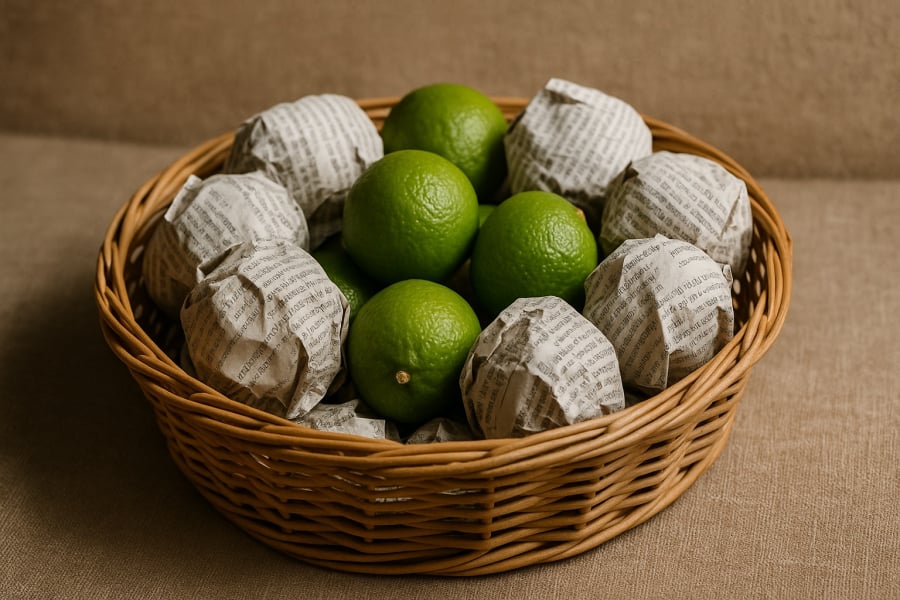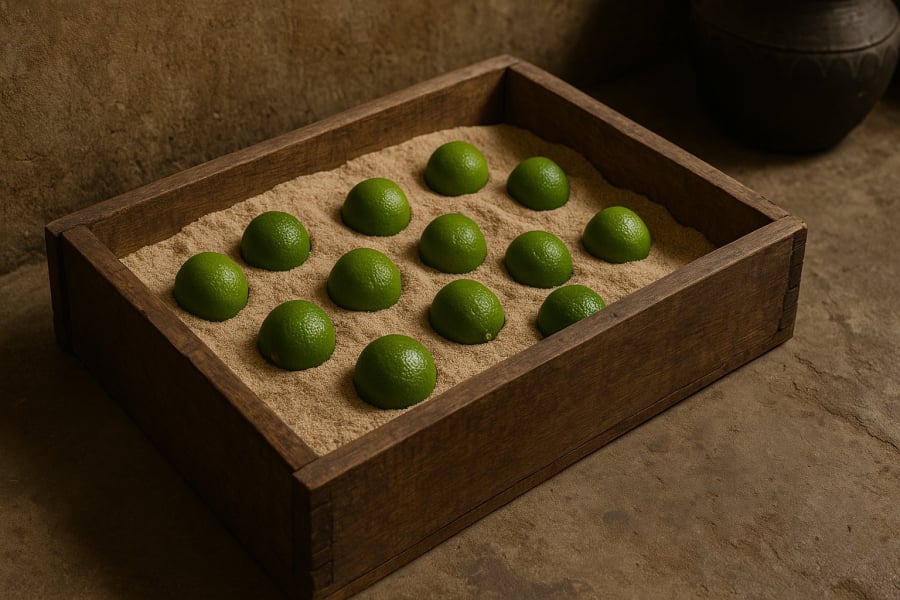Why Do Lemons Go Bad So Quickly?
Before getting to the tips, let’s quickly explore why lemons tend to spoil so easily. Lemons have a high water content, thin skin, and are susceptible to bacterial infections and softening when exposed to moist air. If kept in hot and humid conditions, such as in a kitchen during cooking, lemons are prone to developing mold, soft rot, or dark discoloration.
While it may seem like the best option, storing lemons in the refrigerator can sometimes backfire. The moisture in the fridge can cause condensation on the lemons, leading to soft skin, discoloration, and eventual wilting.
Instead of relying solely on the fridge, I’ll share with you some traditional storage methods that are extremely convenient and cost-effective.
Wrap Lemons in Dry Paper Before Storing
Tools needed: Old (but clean) newspaper, dry paper towels, or dry tissue paper.
Method:
- Select lemons that feel firm, are evenly shaped, and have smooth, unblemished skin.
- Wrap each lemon individually in paper, especially around the stem and vulnerable areas of the peel.
- Place the wrapped lemons in a basket or tray and keep them in a well-ventilated, dry area.
The dry paper absorbs moisture effectively, preventing direct contact between moisture and the lemon’s peel. This helps to keep the lemons from softening and inhibits mold growth. If the paper feels slightly damp, simply replace it with a fresh sheet—it’s that simple!

Use a Bamboo Basket or Mesh Bag
Instead of keeping lemons in a closed box or basket, try using a bamboo basket or mesh bag (fabric or mesh produce bags) to improve air circulation.
Method:
- After wrapping the lemons in dry paper, place them in a bamboo basket or mesh bag.
- Hang or place the container in a well-ventilated area, avoiding direct sunlight (such as near a stove or sink).
- Inspect the lemons weekly and remove any that show signs of spoilage, such as soft skin or brown discoloration.
The improved air circulation helps prevent moisture buildup and eliminates the risk of rotten lemons. This storage method is extremely economical and environmentally friendly.
Traditional Tip: Clean Ash or Sand
If you have a large quantity of lemons and want to store them for an extended period, consider trying the traditional method of burying them in clean ash or dry sand.
Method:
- Prepare clean ash (free from fire and properly treated) or food-grade sand for food storage.
- Use a box or small container and spread a layer of dry ash or sand at the bottom.
- Arrange the lemons on top, and then cover them with an additional 1–2 cm of ash or sand, ensuring the lemons do not touch each other directly but remain dry.
Ash and sand are natural moisture absorbers, preventing excess moisture and light—both of which promote mold growth—from reaching the lemons. Stored in a cool place, lemons can remain fresh for up to 2 months using this method.

Some Tips for Choosing Lemons
The key to successful long-term storage starts with selecting the right lemons. Here are some criteria to keep in mind:
- Choose lemons that are small to medium in size, feeling firm yet slightly yielding when gently squeezed, and with smooth, taut skin.
- Look for lemons with fresh, green stems; lemons with brown spots or discolored stems are more prone to spoilage.
- Avoid overly ripe lemons or those with pitted skin, as they are more susceptible to mold, even when freshly purchased.
Monitor and Adjust as Needed
- If you notice any lemons with soft skin, leaking juice, or showing signs of mold, remove them immediately to protect the rest.
- Replace the wrapping paper if it becomes damp, and dry the ash or sand if it feels moist before continuing to use it.
Why Do These Methods Work Without Refrigeration?
- Natural moisture absorption: Paper, ash, and sand effectively absorb moisture, which is the primary cause of lemon softening and mold.
- Protection from direct air and light: Moist air and light promote mold growth. The methods mentioned above provide a barrier and create a stable environment.
- Selecting fresh, firm lemons: Choosing high-quality, fresh lemons is the foundation for successful long-term storage, just as selecting fresh ingredients is crucial for cooking.
In summary, it is entirely possible to keep lemons fresh without refrigeration by following these traditional methods. Wrapping lemons in dry paper and storing them in a bamboo basket or mesh bag can maintain their freshness for 6 to 8 weeks. For larger quantities, the folk methods of burying lemons in ash or dry sand are also highly effective, keeping them fresh for up to 2 months. Regardless of the method, the key is to select firm, fresh lemons and to inspect them regularly, removing any spoiled fruit promptly. With these simple techniques, you can efficiently preserve lemons while saving costs and ensuring the safety of your family’s food supply.






























